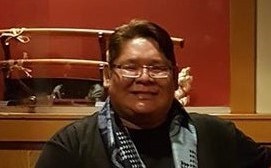“Trent’s legacy is going to be profound.”
Aspiring journalism school graduates are taught not to start articles with quotes, but it seems appropriate for Trent Fox, an uncommon man who highly valued formal education, but came to believe it was the informal, oral history of his Îethka (Stoney) people he really needed to hear.
The quote is from Fox's close friend and fellow Cochrane Eagle columnist Warren Harbeck, who shared thoughts of his ‘brother’ over coffee a couple of weeks after Fox passed away following a heart attack in his sleep on June 8. He was 47.
Fox's column, Îethka Voices, was a popular feature in The Cochrane Eagle, and education was central to his life.
A specialist in Stoney Nakoda language, oral history and culture, Fox was two chapters away from completing his doctoral thesis at the University of Calgary.
As noted in his obituary, Fox was raised at Mînî Thnî by his mother, Valentina, and late father, Kent Fox (Tae-Dae). His childhood was marked by ranching and fencing with Tae-Dae, riding horses with his siblings and friends, and going on road trips with family.
Trent attended elementary school at Exshaw School and high school at Cochrane High School and Plains Indian Cultural Survival School, where he graduated.
Trent cared about the well-being of the Stoney Nakoda people and hired relatives in need to do yard work and fencing. Whether cooking, inviting family and friends over for dinner, writing, or debating, his cherished canine companions Clay and Rocky were almost always by his side.
He got his bachelors’ degree in native studies from Brandon University (1993), masters’ degree in education from Gonzaga University in Washington (2014) and was a PhD candidate at the University of Calgary’s Werklund School of Education, where he studied Stoney history and the Nakoda language.
Fox was a proud 2 Spirited Stoney Nakoda man who loved his family and community.
As he accumulated accolades in the formal, non-indigenous education system, Fox came to understand the importance of traditional Stoney Nakoda teachings, as related by his mother and others. His mother (who goes by Tina) is an esteemed Stoney Nakoda Elder.
“My kids didn't have the benefit of growing up with grandparents, and I tried to teach them what little I knew about our culture, our customs and traditions,” Tina told The Eagle.
She remembers her son’s sense of humour and self-deprecating jokes, and said she made a point of instilling a respect for education in her children – daughter Terry is a PhD in public administration.
“Yes, I made sure they went to school,” Tina said. “All of my kids have degrees.”
The educational achievements are clearly a source of pride, but front of mind for her, is something else.
“When I remember Trent, I remember his kindness,” she said.
And despite his writings and teachings, he was a shy, humble man. His mother said she remembers Fox always making fun of himself.
He developed culturally appropriate alternative measures for Nakoda Youth Justice.
He honoured his late sister Kim by carrying on her Stoney Nakoda language work, and by publishing two books; Nakota Community (2018) and Grizzly Bear Woman Teaches the A’s, Â’s & B’s (2019).
Fox established his own business, the Îethka Îabi Institute, an incorporated society with a mission to promote the Îethka language and Stoney cultural teachings.
Through the Îethka Îabi Institute, Trent successfully applied for almost $500,000 in grant funding that he used to pursued various Îethka language projects, including a 2022 Stoney calendar, a Stoney Elder/Youth mentorship program, a Stoney language conference, and an Îethka Îabi dictionary.
Stoney people relied on Fox for Îethka pronunciations, meanings, and spellings.
Harbeck’s musings on his late friend combined love and respect.
“He loved cooking. He loved his dogs,” Harbeck said wistfully.
On a deeper note, Harbeck said Fox came to have an understanding of knowledge and knowledge-keeping, which informed his life-long learnings.
His mother and father both survived residential schools.
“Trent was totally committed to integrity, in his relationship with his own community, (and) the academic community, and sometimes, integrity with the academic community was at the expense of integrity to his elders,” Harbeck said.
If the academic community and the Stoney Elders’ perspectives clashed, Fox always respected the Stoney Nakoda cultural viewpoints.
Fox had to come to terms with the realization that perspectives ingrained in non-Indigenous education systems did not dovetail with the teachings of the Stoney Nakoda elders.
The two perspectives often present conflicting ways of looking at the world.
Colonization has become a term fraught with cultural sensitivities and connotations at the core of Indigenous/non-Indigenous confrontations.
“Trent just had a knack of articulating it very well, but putting it into action,” Harbeck said.
When he was with young people – as he often was – Trent stressed the importance of education.
Tina Fox said after Trent died, the family received many messages and Facebook posts about how impactful he had been in their lives.
“I don’t think he knew his greatness, I guess,” she said.



